| Listing 1 - 10 of 64 | << page >> |
Sort by
|
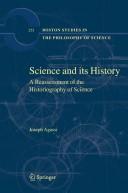
ISBN: 140205632X 1402056311 Year: 2008 Volume: 253 Publisher: [Dordrecht?] : Springer,
Abstract | Keywords | Export | Availability | Bookmark
 Loading...
Loading...Choose an application
- Reference Manager
- EndNote
- RefWorks (Direct export to RefWorks)
Professor Joseph Agassi has published his Towards an Historiography of Science in 1963. It received many reviews by notable academics, including Maurice Finocchiaro, Charles Gillispie, Thomas S. Kuhn, George Mora, Nicholas Rescher, and L. Pearce Williams. It is still in use in many courses in the philosophy and history of science. Here it appears in a revised and updated with responses to these reviews and with many additional chapters, some already classic, others new. They are all paradigms of the author’s innovative way of writing fresh and engaging chapters in the history of the natural sciences.
Science --- Historiography. --- History. --- Philosophy. --- Normal science --- Philosophy of science
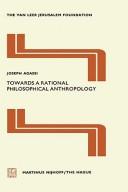
ISBN: 9024720036 9401010978 9401010951 9789024720033 Year: 1977 Publisher: The Hague Nijhoff
Abstract | Keywords | Export | Availability | Bookmark
 Loading...
Loading...Choose an application
- Reference Manager
- EndNote
- RefWorks (Direct export to RefWorks)
Philosophical anthropology --- Philosophy of science --- 130.1 --- Anthropology, Philosophical --- Man (Philosophy) --- Civilization --- Life --- Ontology --- Humanism --- Persons --- Philosophy of mind --- Wijsgerige antropologie:--algemene begrippen en wetmatigheden --- Philosophy --- Philosophical anthropology. --- 130.1 Wijsgerige antropologie:--algemene begrippen en wetmatigheden
Book
ISBN: 3319065874 3319065866 Year: 2014 Publisher: Cham : Springer International Publishing : Imprint: Springer,
Abstract | Keywords | Export | Availability | Bookmark
 Loading...
Loading...Choose an application
- Reference Manager
- EndNote
- RefWorks (Direct export to RefWorks)
This volume examines Popper’s philosophy by analyzing the criticism of his most popular critics: Thomas Kuhn, Paul Feyerabend and Imre Lakatos. They all followed his rejection of the traditional view of science as inductive. Starting from the assumption that Hume’s criticism of induction is valid, the book explores the central criticism and objections that these three critics have raised. Their objections have met with great success, are significant and deserve paraphrase. One also may consider them reasonable protests against Popper’s high standards rather than fundamental criticisms of his philosophy. The book starts out with a preliminary discussion of some central background material and essentials of Popper’s philosophy. It ends with nutshell representations of the philosophies of Popper. Kuhn, Feyerabend and Lakatos. The middle section of the book presents the connection between these philosophers and explains what their central ideas consists of, what the critical arguments are, how they presented them, and how valid they are. In the process, the author claims that Popper's popular critics used against him arguments that he had invented (and answered) without saying so. They differ from him mainly in that they demanded of all criticism that it should be constructive: do not stop believing a refuted theory unless there is a better alternative to it. Popper hardly ever discussed belief, delegating its study to psychology proper; he usually discussed only objective knowledge, knowledge that is public and thus open to public scrutiny.
Popper, Karl R. --- Feyerabend, Paul, --- Criticism and interpretation. --- Feyerabend, P. K. --- Feyerabend, Paul Karl --- Popper, Karl Raimund --- Popper, K.R. --- Philosophy (General). --- Science --- Philosophy, general. --- Philosophy of Science. --- Philosophy. --- Normal science --- Philosophy of science --- Philosophy and science. --- Science and philosophy --- Mental philosophy --- Humanities
Book
ISBN: 9027720444 9027720452 Year: 1985 Volume: v. 11 Publisher: Dordrecht Boston Tokyo Reidel
Abstract | Keywords | Export | Availability | Bookmark
 Loading...
Loading...Choose an application
- Reference Manager
- EndNote
- RefWorks (Direct export to RefWorks)
Philosophy of science --- Sociology of work --- Technology --- Technologie --- Philosophy --- Social aspects --- Philosophie --- Aspect social --- -Technology --- -Applied science --- Arts, Useful --- Science, Applied --- Useful arts --- Science --- Industrial arts --- Material culture --- Philosophy. --- Social aspects. --- -Philosophy --- Technology and civilization
Book
ISBN: 0226010465 Year: 1971 Publisher: Chicago (Ill.): University of Chicago press
Abstract | Keywords | Export | Availability | Bookmark
 Loading...
Loading...Choose an application
- Reference Manager
- EndNote
- RefWorks (Direct export to RefWorks)
Philosophy of nature --- History of physics --- Faraday, Michael --- Physics --- history --- Faraday, Michael, --- Faraday, M. --- Faradeĭ, Mikhail, --- Faradeĭ, Maĭkŭl, --- Fa-la-ti, --- פאראדײ, מ. --- Faradeĭ, Maĭkl, --- Фарадей, Майкл,
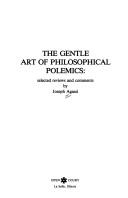
ISBN: 0812690362 9780812690361 Year: 1988 Publisher: La Salle Open court
Abstract | Keywords | Export | Availability | Bookmark
 Loading...
Loading...Choose an application
- Reference Manager
- EndNote
- RefWorks (Direct export to RefWorks)
Philosophy of science --- Philosophy --- Book reviews --- -Mental philosophy --- Humanities --- -Book reviews --- Mental philosophy --- Philosophy - Book reviews
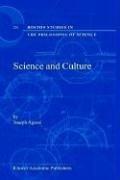
ISBN: 1402011563 9048162343 9401729468 Year: 2003 Volume: 231 Publisher: Dordrecht : Kluwer academic,
Abstract | Keywords | Export | Availability | Bookmark
 Loading...
Loading...Choose an application
- Reference Manager
- EndNote
- RefWorks (Direct export to RefWorks)
In Science and Culture, Joseph Agassi addresses scientism and relativism, two false philosophies that divorce science from culture in general and from tradition in particular. According to Agassi, science is an integral part of culture, and both scientism and relativism ignore the cultural value of science. This work helps break the isolation of science from the rest of culture by promoting popular science and reasonable history of science. Agassi provides examples of the value of science to culture at large, discussions of items of the general culture and their interactions with science, and practical strategies and tools. He offers a wide variety of case studies to exemplify these. In this book Agassi puts significant topics such as autonomy, tolerance, reason, philosophy and responsibility on the agenda of democratic philosophy today.
Philosophy of science --- Philosophy and psychology of culture --- Relativism --- Relativisme --- Relativisme (Filosofie) --- Relativisme (Philosophie) --- Relativiteit --- Relativity --- Relativité --- Scientism --- Scientisme --- Sciëntisme --- Relativity. --- Science --- Scientism. --- Philosophy. --- Social aspects. --- Knowledge, Theory of --- Science and society --- Sociology of science --- Normal science --- Reality --- Relationism --- Philosophy --- Social aspects --- Methodology --- Epistemology. --- History. --- Political science. --- History, general. --- Political Science. --- Administration --- Civil government --- Commonwealth, The --- Government --- Political theory --- Political thought --- Politics --- Science, Political --- Social sciences --- State, The --- Annals --- Auxiliary sciences of history --- Epistemology --- Theory of knowledge --- Psychology
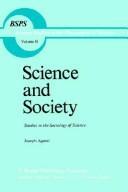
ISBN: 9027712441 902771245X 9401164584 9401164568 9789027712448 Year: 1981 Volume: v. 65 Publisher: Dordrecht Reidel
Abstract | Keywords | Export | Availability | Bookmark
 Loading...
Loading...Choose an application
- Reference Manager
- EndNote
- RefWorks (Direct export to RefWorks)
Sociology of knowledge --- Political philosophy. Social philosophy --- Science --- Sciences --- Social aspects --- Philosophy --- Aspect social --- Philosophie --- 316.75:001 --- -Science --- -#SBIB:316.23H2 --- Natural science --- Science of science --- Wetenschapssociologie --- Sociologie van de wetenschappen --- Philosophy. --- Social aspects. --- 316.75:001 Wetenschapssociologie --- #SBIB:316.23H2 --- Science and society --- Sociology of science --- Normal science --- Philosophy of science --- Science - Social aspects --- Science - Philosophy
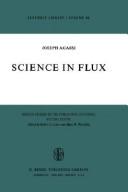
ISBN: 9027705844 9027706123 9401018103 9789027705846 Year: 1975 Volume: v. 28 Publisher: Dordrecht Reidel
Abstract | Keywords | Export | Availability | Bookmark
 Loading...
Loading...Choose an application
- Reference Manager
- EndNote
- RefWorks (Direct export to RefWorks)
Science --- Sciences --- Philosophy --- Philosophie --- 5:1 --- -#KVIV --- Natural science --- Science of science --- Wiskunde. Natuurwetenschappen-:-Filosofie. Psychologie --- Philosophy. --- 5:1 Wiskunde. Natuurwetenschappen-:-Filosofie. Psychologie --- Natural sciences --- Philosophie des sciences --- -Philosophy
Book
ISSN: 00680346 ISBN: 9400753500 9400797753 9400753519 1283936070 Year: 2013 Volume: v. 298 Publisher: Dordrecht : Springer Netherlands : Imprint: Springer,
Abstract | Keywords | Export | Availability | Bookmark
 Loading...
Loading...Choose an application
- Reference Manager
- EndNote
- RefWorks (Direct export to RefWorks)
This book is a study of the scientific revolution as a movement of amateur science. It describes the ideology of the amateur scientific societies as the philosophy of the Enlightenment Movement and their social structure and the way they made modern science such a magnificent institution. It also shows what was missing in the scientific organization of science and why it gave way to professional science in stages. In particular the book studies the contributions of Sir Francis Bacon and of the Hon. Robert Boyle to the rise of modern science. The philosophy of induction is notoriously problematic, yet its great asset is that it expressed the view of the Enlightenment Movement about science. This explains the ambivalence that we still exhibit towards Sir Francis Bacon whose radicalism and vision of pure and applied science still a major aspect of the fabric of society. Finally, the book discusses Boyle’s philosophy, his agreement with and dissent from Bacon and the way he single-handedly trained a crowd of poorly educated English aristocrats and rendered them into an army of able amateur researchers.
Bacon, Francis, 1909-1992 -- Exhibitions. --- Boyle, Robert, 1627-1691. --- Science -- Early works to 1800. --- Science. --- Science --- Physical Sciences & Mathematics --- Philosophy & Religion --- Sciences - General --- Philosophy --- History --- Philosophy. --- Bacon, Francis, --- Boyle, Robert, --- Normal science --- Philosophy of science --- T. E., --- E., T., --- R. B. --- B., R. --- Person of quality, --- Person of honour, --- Boyle, R. --- Fellow of the Royal Society, --- Boyle, Robertus, --- T. H. R. B. --- B., T. H. R. --- Bacon de Verulam, François --- Bacon, François --- Philosophy and science. --- Philosophy of Science. --- Science and philosophy
| Listing 1 - 10 of 64 | << page >> |
Sort by
|

 Search
Search Feedback
Feedback About
About Help
Help News
News